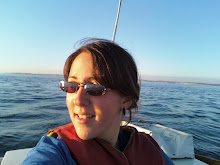...this press release regarding the recent sonar near Haro Strait...
...and this article about sonar causing temporary deafness in dolphins...
...and this blog from the Marine Mammal Center, reporting a dead orca calf near Monterey Bay...
...which reminds me of the recent death of T44, a known transient orca. I wonder how that necropsy is going? It's quite rare to get a chance to study a transient in such detail. It wouldn't be surprising to discover that T44 was chock-full of PCBs, DDTs, and other toxins. I wonder how that will compare with the levels of toxins found in other transients and residents?
Showing posts with label research. Show all posts
Showing posts with label research. Show all posts
Friday, April 10, 2009
Wednesday, April 1, 2009
Can You Say "Irrawaddy" 6,000 Times Fast?
 According to Scientific American, the Wildlife Conservation Society has found about 6,000 of the rare Irrawaddy dolphins in Bangladesh...
According to Scientific American, the Wildlife Conservation Society has found about 6,000 of the rare Irrawaddy dolphins in Bangladesh......in the fresh waters surrounding the Sundarbans mangrove forest and in the nearby Bay of Bengal, areas where the WCS says little marine mammal research has previously been conducted. This discovery nearly doubles the estimates of the worldwide population for the rare dolphins, and represents the largest single population of the species.
Just think; if 6,000 Irrawaddy can be found in the waters around a mangrove forest, what other species could be alive that we don't know about? Makes me want to check in on the Census of Marine Life and see what else they've found since I last checked.
Thursday, January 8, 2009
121 Years
Is it really 2009 already? I've been so swamped with work lately, writing curricula on orca communication and sound underwater, that I've hardly had time for anything else. As I type this I'm catching up on all my favorite marine science blogs and watching the live dissection of a great white shark. (Have you watched that yet?)
Philip over at the New England Aquarium's Right Whale Aerial Survey Blog reports that a North Atlantic Right Whale has been seen in the Azores by biologists at the University of the Azores Dept. of Oceanography and Fisheries. This observation marks the first time a right whale has been seen around there since 1888. That's 121 years since the last sighting! Also, it turns out that this specific whale had been seen and cataloged by the folks at the New England Aquarium as recently as September of 2008. Whoa. So cool!
As exciting as this news is -- and it is very exciting -- I'm even more impressed with the Right Whale Catalog that the New England Aquarium has put together. Maintaining this resource must be a huge undertaking, and I'm glad to see it readily available online. You know what they say: "Sharing is caring!"
Philip over at the New England Aquarium's Right Whale Aerial Survey Blog reports that a North Atlantic Right Whale has been seen in the Azores by biologists at the University of the Azores Dept. of Oceanography and Fisheries. This observation marks the first time a right whale has been seen around there since 1888. That's 121 years since the last sighting! Also, it turns out that this specific whale had been seen and cataloged by the folks at the New England Aquarium as recently as September of 2008. Whoa. So cool!
As exciting as this news is -- and it is very exciting -- I'm even more impressed with the Right Whale Catalog that the New England Aquarium has put together. Maintaining this resource must be a huge undertaking, and I'm glad to see it readily available online. You know what they say: "Sharing is caring!"
Friday, January 2, 2009
Whale Workshop Weekend and Whale Song
At the end of January, down at Camp Ocean Pines in Cambria, California there will be a Humpback Whale workshop, led by scientist and co-founder of the Whale Trust, Dr. Jim Darling. Dr. Darling's current research is on the function of Humpback songs, which he studies from the Hawaiian island of Maui. Lucky guy!
I wonder if Dr. Darling has read Fluke by Christopher Moore? In the book, the characters figure out that the songs of Humpbacks can be translated into binary, and from that into English. What, you don't think that's possible? I would love to see someone try. I can see the article title now, "It actually means something!: Humpback song translated into binary code," or, "It has nothing to do with mating: What it really means and why they want to play Wii so bad."
Okay, who's going to help me get the Humpback/binary project started? First we'll need funding...
I wonder if Dr. Darling has read Fluke by Christopher Moore? In the book, the characters figure out that the songs of Humpbacks can be translated into binary, and from that into English. What, you don't think that's possible? I would love to see someone try. I can see the article title now, "It actually means something!: Humpback song translated into binary code," or, "It has nothing to do with mating: What it really means and why they want to play Wii so bad."
Okay, who's going to help me get the Humpback/binary project started? First we'll need funding...
Subscribe to:
Posts (Atom)
